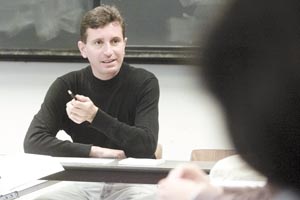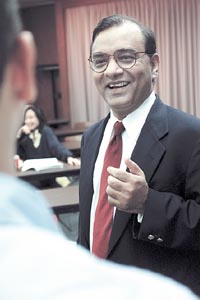Irving B. Harris Graduate School of Public Policy Studies Professors of the Year: Don Coursey, Ameritech Professor in the Harris School, Helen Levy, Assistant Professor in the Harris School, and Raaj Sah, Professor in the Harris School
By Peter SchulerNews Office
The Public Policy Student Association of the Irving B. Harris Graduate School of Public Policy Studies has named three exemplary teachers as Professors of the Year for 2001. The student group chose Don Coursey, the Ameritech Professor in the Harris School, a winner of the award for the last three, consecutive years; Helen Levy, Assistant Professor in the Harris School; and Raaj Sah, Professor in the Harris School, who has received this award in previous years.
 Don Coursey |
Coursey is a noted experimental economist whose research is concerned largely with eliciting reliable measures of preferences and monetary values for public goods, particularly environmental quality. “I try to make economics both theoretical and at the same time as fresh as possible,” Coursey said in explaining his approach to teaching. “For my final exam, I used the issues floating around in the world on the Sunday I wrote the exam, taken from articles in the New York Times and the Chicago Tribune.”
Like his colleagues, Coursey said he believes the Harris School graduate moves into a public policy career with a much stronger quantitative foundation than his or her peers do. “My students not only have a rigorous theoretical underpinning in economics and political science, but also a better analytical tool kit in statistics and econometrics that will set them apart.”
Coursey joined the Harris School faculty in 1993 and was Dean from 1996 to 1998. He previously taught at the University of Wyoming and Washington University in St. Louis. He received both a B.A. in mathematics and a Ph.D. in economics from the University of Arizona.
He said his students are still as bright as ever. “They are attracted now to areas of government and the private sector where they know public policy professionals can make a difference.” Coursey does see a greater need to focus on basic concepts that affect the environment. “Unfortunately, I do find that more of my students these days are disconnected from their physical environment because of the nature of modern urban life. So we often begin with rather primitive concepts like how that energy gets into the power plugs in the house or what happens to the garbage when it’s picked up at the curb.”
With a team of researchers, Coursey currently is investigating e-coli outbreaks on public beaches. “We want to know what the costs and benefits are of making forecasts of beach closures.”
He explained the relationship between his teaching and research. “At this point in my career, there is no difference between the two. What my students and I discuss in class informs all my research, and the research problems that keep me awake end up as questions in the classroom. And that’s just the way the process should work.”
 Helen Levy |
Levy, who joined the Harris School faculty last year, earned a B.A. in mathematics and history from Yale University, and a doctorate in economics from Princeton University. She said while teaching the two courses she has taught at the Harris School, she recalled two Princeton professors whom she admires. “One was my adviser, Hank Farber, for whom I was a teaching assistant,” Levy said. “He taught applied econometrics, and the students just loved him. He was so excited about his subject, and that came across. The other professor was Bo Honore, who also taught econometrics. When we were approaching difficult material, he would say, ‘There’s no reason you should already know this. This will be complicated for you.’ We were profoundly grateful to him because he was always thinking about what it was like for the students.”
Before coming to the Harris School, Levy was a Robert Wood Johnson Foundation Scholar in Health Policy Research at the University of California, Berkeley.
She said economics provides the analytical framework for her thinking about public policy issues. “My course only dealt with perfect markets where there is no role for government to make things more efficient, but students need a strong understanding of that model before they can move on to talk about market failures and other situations where there is room for government to make things better.” Levy praised the diligence of her students. “I was especially impressed by the effort made by those who did not arrive here with a foundation in economics.”
Levy summed up her first year at Chicago. “There is no shortage of public policy schools where the political and anecdotal are dominant. It’s very nice to be in a place where people who care about these problems come at them with a rigorous, analytic approach.”
 Raaj Sah |
Sah’s teaching award is his third at the Harris School. He has taught courses on tax policy as well as on microeconomics and finance. “A key challenge of mine is to inspire students,” said Sah of his teaching. “If that happens, then given the high quality of the students at Chicago, other things follow with ease, including the learning of concepts, methods and new ways of thinking.”
Sah joined the Harris School faculty in 1992. He spent a sabbatical year visiting the Economics Department at the University from 1989-90, a department in which he also has taught graduate students.
His areas of research are public finance, economics of organizations and economic analysis of social issues such as crime and corruption. Sah has published extensively in the leading research journals in economics and is the coauthor, with Joseph Stiglitz, of the book Peasants versus City-Dwellers: Taxation and the Burden of Economic Development (Oxford University Press). He has advised many governments, international organizations and private financial institutions.
Sah’s undergraduate education was in India, where he also earned an M.B.A. at the Indian Institute of Management, Ahmedabad. He received his Ph.D. in economics from the University of Pennsylvania. He has previously served on the faculties of the Massachusetts Institute of Technology and Yale University.
He noted that the program for Harris School students is significantly different from other public policy schools. “The rigorous quality of training of our students marks them throughout their careers in the way they think about solving problems. We don’t make compromises here and it shows in our graduates.”
![[Chronicle]](/images/small-header.gif)